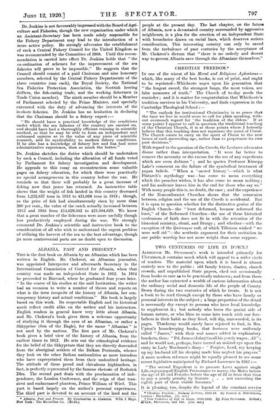ALBANIA, PAST AND PRESENT.*
Tars is the first book on Albania by an Albanian which has been written in English. Mr. Chekrezi, an Albanian journalist, was appointed Interpreter and afterwards Secretary to the International Commission of Control for Albania, when that country was made an independent State in 1912. In 1914 he proceeded to Harvard, where he graduated four years later. " In the course of his studies at the said Institution, the writer had an occasion to write a number of theses and reports on what is the terra incognita of the history of Albania, her con- temporary history and actual conditions." His book is largely based on this work. Its respectable English and its historical merit reflect credit alike on the author and his instructors. English readers in general know very little about Albania, and Mr. Chekrezi's book gives them a welcome opportunity of studying it through the eyes of an Albanian, or rather a Shkypetar (Son of the Eagle), for the name " Albanian " is not used by the natives. The first part of Mr. Chekrezi's book gives a brief view of the history of Albania, from the earliest times to 1912. He sets out the ethnological evidence for the belief of the Shkypetars that they are directly descended from the aboriginal settlers of the Balkan Peninsula, whence they look on the other Balkan nationalities as mere intruders who have expropriated them from their undoubted heritage. The attitude of these proud and chivalrous highlanders, in fact, is perfectly represented by the famous rhetoric of Roderick Dhu. The second part deals with the proclamation of inde- pendence, the London Conference, and the reign of that tran- sient and embarrassed phantom, Prince William of Wied. This part is based largely on tho author's personal experiences. The third part is devoted to an account of the land and the * Albania. Past and Present. By Constantine .4. Chekrezt. With 2 Maps. New York : The Macmillan Co. 112.25.] people at the present day. The last chapter, on the future of Albania, now a devastated country surrounded by aggressive neighbours, is a plea for the erection of an independent State with boundaries drawn on racial lines, which deserves serious consideration. This interesting country can only be saved from the turbulence of past centuries by the acceptance of Mr. Chekrezi's dictum that " there is no orderly and decent way to govern Albania save through the Albanians themselves."






































 Previous page
Previous page